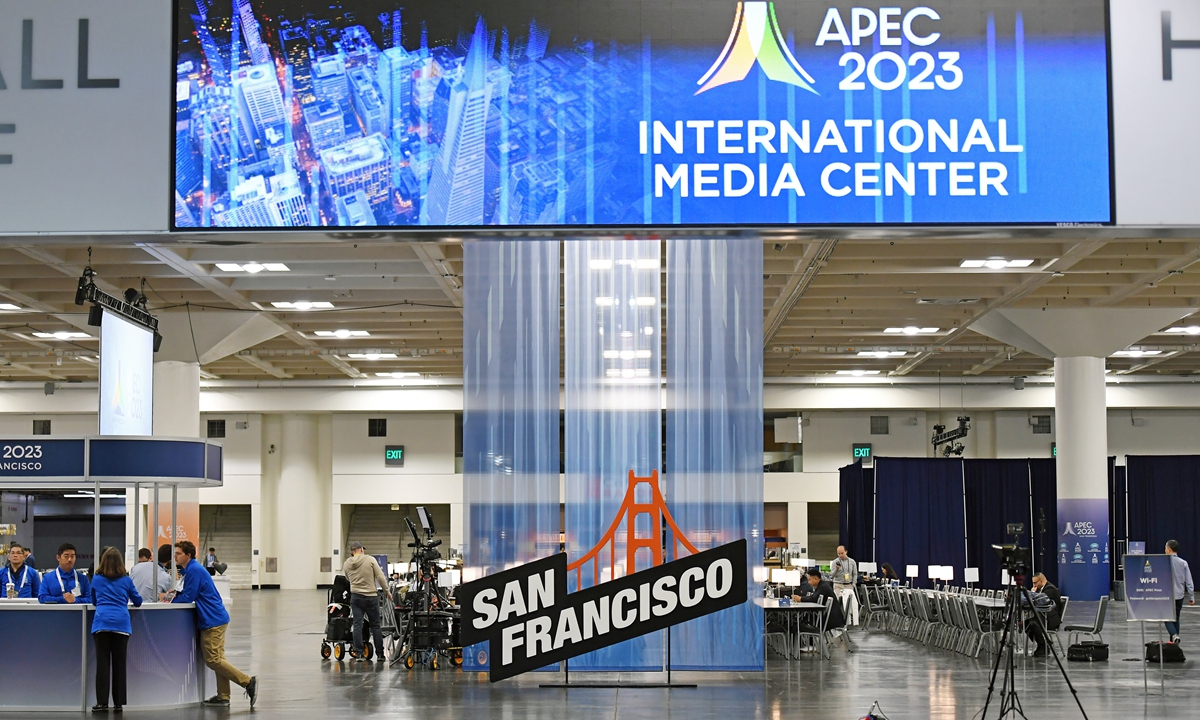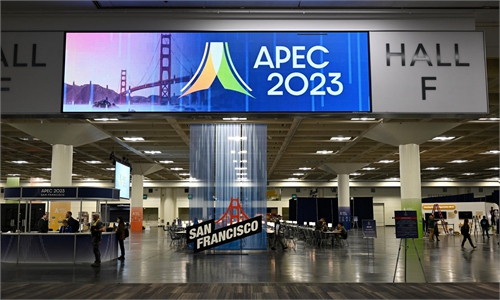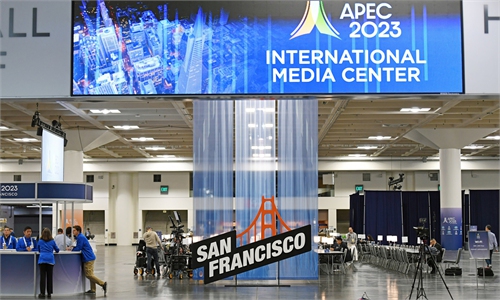APEC should uphold open regionalism; all parties need to avoid creating 'small cliques': Chinese vice commerce minister

Reporters work at the media center for the APEC meetings on November 12, 2023 in San Francisco. The APEC Economic Leaders' Week runs from November 11 to 17. Photo: Xinhua
APEC should uphold open regionalism and maintain the primary status of the Asia-Pacific Free Trade Area (FTA). All parties should avoid creating closed and exclusive "small cliques" within the region, Chinese Vice Commerce Minister Wang Shouwen said at the 34th APEC Ministerial Meeting held in San Francisco on Tuesday and Wednesday.
The Regional Comprehensive Economic Partnership (RCEP) and Comprehensive and Progressive Agreement for Trans-Pacific Partnership (CPTPP) are two possible paths for the Asia-Pacific FTA jointly identified by APEC economies' leaders. It is necessary to adhere to openness and inclusiveness, continuously promote the expansion process, and benefit more economies, Wang said.
"It is vital to prioritize development, giving full consideration to the interests of developing economies, and especially groups such as women. All parties should harness the potential of green and digital technologies, promote the trade of environmentally friendly products such as photovoltaics and new-energy vehicles, reduce trade barriers, and strengthen cooperation on standards in relevant fields," Wang said.
China is willing to engage in practical cooperation with more APEC economies in the areas of the digital economy and green development, Wang noted.
The IMF recently raised its 2023 economic growth forecast for China from 5 percent to 5.4 percent, Wang said, pledging that China will further expand high-level opening-up. "China is willing to share development opportunities in its vast market with APEC economies and the global community, and promote high-quality development and prosperity."
Observers noted that as the world's second-largest economy, China has been unswervingly promoting its opening-up policy and supporting multilateral free trade across the world. The country is committed to enhancing regional economic integration and has made great contributions to the recovery and development of the regional economy.
For instance, after the implementation of the RCEP, most member countries experienced robust growth in foreign trade, and there has been a positive trend in utilizing foreign investment as well, observers said.
"Even against the backdrop of nearly stalled negotiations for large-scale regional trade liberalization, China has continued to actively promote its opening-up efforts," Zhou Fangyin, professor at the Guangdong Research Institute for International Strategies, told the Global Times on Thursday.
This is evident in events such as the just-concluded 6th China International Import Expo, the Canton Fair, and the push to upgrade free trade zones (FTZs) with ASEAN members and other individual countries, Zhou noted.
Observers also expressed concern over the lack of joint efforts by certain regional economies to propel free trade, such as the US. "The US shows no enthusiasm for FTZs, and its protectionist stance is strengthening domestically. It is not interested in tariff reductions or trade liberalization," Zhou said.
Yet, in driving regional economic integration, China has consistently fulfilled its commitments and its attitude has never wavered, Zhou stressed.
He Yadong, a spokesperson for the Chinese Commerce Ministry (MOFCOM), told a press briefing on Thursday that the leaders of China and the US successfully held a meeting in San Francisco on Wednesday, charting the course for the development of bilateral relations and economic and trade ties.
The MOFCOM will diligently implement the important consensus reached by the leaders and ramp up efforts to promote the healthy and stable development of bilateral economic and trade relations, injecting more stability and positive energy into the world economy, said the spokesperson.
During the APEC informal leadership meeting, MOFCOM head Wang Wentao will hold further discussions with US Commerce Secretary Gina Raimondo to address important issues in the implementation of the consensus reached by the leaders and to resolve key matters in the bilateral economic and trade relationship, He said, adding that updates will be provided as the situation develops.
The ministerial meeting engaged in discussions on various topics, including supporting the multilateral trading system, regional economic integration, supply chain collaboration, the digital economy, promoting inclusivity, and sustainable trade and investment.


